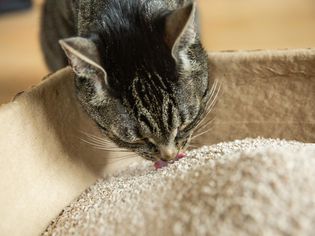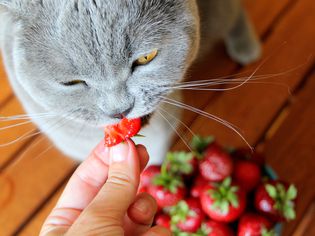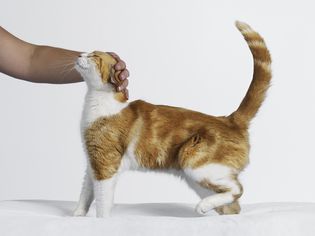
Why Do Cats Knock Things Over?
Cats have a reputation for knocking things off counters and shelves. In fact, a quick sea...
Cat humping isn't uncommon, even for neutered male cats. They'll hump other cats (and even inanimate objects) because of urinary tract infections, stress, or other health and behavioral reasons. This can result in stress for both you and the second cat, who may not want to be stalked and mounted.
If a fixed male cat is regularly humping another cat, there are a few ways you can find out what's going on and stop or manage the humping. Here's what cat humping means—and ways to prevent the behavior.
Neutering may not automatically stop a male cat from mounting (grasping with his forepaws, gripping her neck with his teeth) and humping other cats. The behavior may be due to health issues, your cats' social hierarchy, or other problems.
Humping behavior is normal for whole (sexually intact) male cats. Even after castration surgery, it takes time for the hormones to leave the body, and it's not unusual for mounting to continue for at least a few weeks after the procedure—if not longer.
Urinary tract infections may also lead to humping behavior in some cats.
It’s always best to first have your veterinarian rule out health issues. If it turns out your cat is physically healthy and the humping behavior has been consistent, it's likely a behavioral issue.
Cat humping can be related to stress and anxiety. This is most likely when something has recently changed in the cat's environment: the addition of a new family member, a move, or even a neighborhood cat appearing in the window. Boredom is another cause of humping in cats.
However, cats also use mounting behavior as a way to reinforce social ranking. Cats reach social maturity between the ages of 2 and 4 years. Before that, they may get along famously, and then suddenly the cats’ social ranking starts to matter. Your male cat's stalking, mounting, and chasing your other cat away from important resources may reflect territorial issues or pushy behavior.

If a medical cause is found for your cat's humping, your veterinarian will recommend the best course of treatment. Behavioral causes can be somewhat more difficult to solve. You'll need a good understanding of how the cat world works so you can work with (rather than against) the natural instincts of your feline family members. You may need professional help in some cases, so ask your vet for a referral to a certified animal behaviorist.
Make sure your cat is getting all the attention, mental stimulation, and exercise he needs. Play with your cat every day. If you pinpoint a source of stress, do what you can to relieve it.
If you see your cat getting ready to hump, try to redirect his attention to something else. Offer a toy or play a game with the humping cat so he'll leave your other cat (or you) alone. However, do not punish or yell at your cat as this will only increase stress levels, which may lead to more humping and mounting.
Find ways to reward your male cat's good behavior. You can do this with treats, toys, or extra attention when he's calm and interacting nicely with your other cats. This is much more effective than common discipline techniques, such as squirting him with water or yelling. Of course, you should never hit your cat.
Giving your cats more space to increase their respective territories can help as well. Cats love to climb, so provide separate cat trees and window perches for each to claim. You can even have fun by installing elevated walkways for your cats to explore.
Sometimes, you also need to provide each cat with their own personal spaces for basic needs. Try to place food and water bowls in different locations so they're not fighting over resources. You should also follow the litter box rule of "two plus one," meaning that you need three boxes for two cats. Make sure these aren't within sight of each other to quell tensions and give all kitties their privacy.

Cats have a reputation for knocking things off counters and shelves. In fact, a quick sea...

Cats may eat litter—and other undesirable materials—for a variety of reasons. This be...

Cats aren't usually as noisy as dogs, but that doesn't mean they don't vocalize. Cats wil...

Cats speak a different language than humans so their behaviors are often actually their w...

Some cats have a habit of eating or chewing on paper. Cats are known to sometimes exhibit...

The health benefits of blueberries are abundant. Blueberries contains vitamins, antioxida...

If you and your cat share a bit of a sweet tooth, you may be wondering—can cats eat str...

Female cats will undergo their first estrous, or heat cycle, when they become sexually ma...

This article must be prefaced with a BIG disclaimer: I am not trained in veterinary medic...
Comments on "Cat Humping: Why a Neutered Cat Still Mounts" :